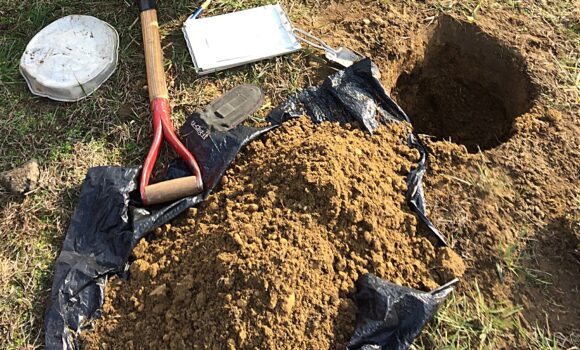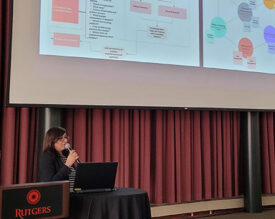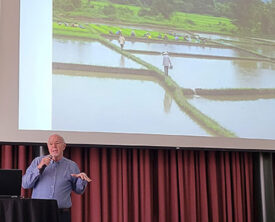
Sandy soil sample and sampling equipment in Lakewood, NJ.
On March 15, seventy faculty and staff of Rutgers School of Environmental and Biological Sciences and the New Jersey Agricultural Experiment Station met at the Cook Campus Center for a full-day, in-person event to assess efforts and inspire further work related to Soil Health. Organized by Stephanie Murphy, director of the Rutgers Soil Testing Lab, the Soil Health Connections symposium covered the range of topics from land use and conservation to climate and climate change mitigation, soil fertility and pest management, plant and animal health, soil structure aspects and water management, the soil microbiome, economic considerations, and soil contamination. Brief presentations by faculty and staff with current or previous work in these diverse Soil Health topics were followed by questions and discussion. The goal for the Soil Health Connections symposium was to create awareness of soil health research and outreach currently being performed at SEBS/NJAES and for subsequent networking to inspire collaborations and enhance further progress in agricultural sustainability for New Jersey.
Soil Health Connections was sponsored by NJAES as one of several Soil Health efforts made possible by the Vision 2025 funding. Vision 2025 is a strategic initiative of targeted investments in infrastructure, IT, and equipment to build greater capacity and capabilities at NJAES to address current and future needs of New Jersey and broader society. The goal of Vision 2025 is for NJAES programs, farms, field stations, business incubators, and centers to be recognized as national models that are sustainable, responsive, innovative and inclusive.

Nazia Arbab presented the many considerations which need to be included in an economic analysis of soil health and related ecosystem services.
Soil Health Connections was kicked off with a welcome from NJAES director of resource and economic development Peggy Brennan-Tonetta and SEBS/NJAES dean/director of research, Wendie Cohick. Stephanie Murphy, director of the Rutgers Soil Testing Laboratory, provided a brief overview of soil health science and outreach efforts nationally, globally, and within Rutgers/NJAES. Brian Schilling, director of Rutgers Cooperative Extension, spoke about land use, soil disturbance and preservation of agricultural and natural ecosystems. New Jersey state climatologist David Robinson elucidated links between soil and climate, and associate director, Rutgers Climate Institute Marjorie Kaplan talked of the links between climate change mitigation and soil health. Distinguished Professor and Chair Department of Biochemistry and Microbiology Max Haggblom and marine and coastal sciences professor Lee Kerkhof shared methods of characterizing the soil microbiome and its relation to soil conditions and management. Plant biology professor James White presented his research that links plant nutrition with uptake of soil microbes into roots and tissue. Extension specialist in turf management James Murphy presented relationships between soil conditions and plant health, and plant pathology professor Peter Oudemans talked of the unique challenges of soil conditions for blueberry culture. The Mineral-Plant-Animal-Human Health spectrum was explained by extension specialist in soil fertility Joseph Heckman. Environmental sciences professor Daniel Gimenez and professor in urban forestry Jason Grabosky emphasized physical aspects of soil health, while extension specialist in water resources Chris Obropta linked soil health to water quality and stormwater management. The economic factors and considerations of soil health practices were discussed by Department of Agricultural, Food, and Resource Economics assistant research professor Nazia Arbab. And Distinguished Professor Mark Robson wrapped up the symposium by sharing experiences about potential contamination risks in soil.
In addition to the presentations, networking and conversations during lunch and breaks promoted development of internal connections and have undoubtedly led to cooperation and ideas to develop better research and additional funding proposals.
With full awareness of Rutgers/NJAES experts and efforts in soil health, we are better equipped to partner with State and federal agencies and other organizations to advance soil health on New Jersey’s farms and other lands.

Mark Robson provided an overview of the possibilities and consequences of soil contamination.
Presentations
- Overview of Soil Health Concepts; SEBS/NJAES Soil Health Survey Results, Stephanie Murphy, Director, NJAES Soil Testing Lab
- Land Use/Soil Disturbance and Conservation, Brian Schilling, Director, RCE
- Climate Links to Soil Health – David Robinson, Marjorie Kaplan
- Characterizing Soil Biology and Microbiomes – Max Haggblom, Lee Kerkhof
- Soil Microbiology & Fertility – James White
- Soil Fertility and Plant Health/Disease – James Murphy, Peter Oudemans
- Mineral-Plant-Animal-Human Health Connections to Soil Health – Joseph Heckman
- Physical Aspects of Soil Health – Daniel Gimenez, Jason Grabosky
- Soil Health Impacts on Water Quality and Stormwater Management – Chris Obropta
- Economic Considerations of Soil Health Practices. Incentive Programs – Nazia Arbab
- Potential Contamination Risks in Soil – Mark Robson
- Discussion, brainstorming, next steps. Wrap up: Call to action, establishing working group
Read more about Rutgers NJAES soil health projects at Soil Health (Rutgers NJAES).

